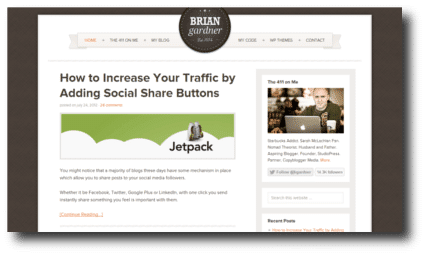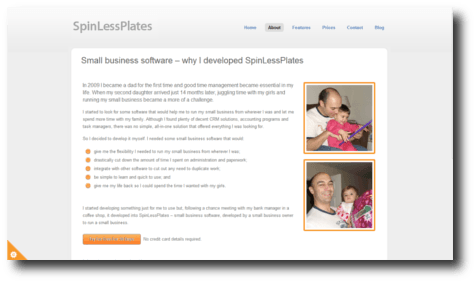 Does your website have personality?
Does your website have personality?
Is it showing that you’re a real person, friendly and a great choice to do business with? Or is it faceless, dull and boring?
I wrote before that having no personality is one of the very common small business website mistakes.
But why does it matter?
Your website often creates the first impression of your small business.
When a potential customer visits your website they are looking at how capable you are of helping them and if you are someone that they could connect with. If they have a choice between two businesses and one looks bland and uninteresting while the other looks friendly and helpful who will they call?
You’ve got it – the website with personality, every time.
You need to have a welcoming website. But more than that, if you want to show visitors that you are the right person to help them, you need to show your personality. Give them enough so that they can connect with you as a person that they want to work with.
So how do you add personality to your small business website without making it all about me, me, me?
Keep reading, I’ve got three steps that will help.
Step 1. Add Your Photos
Adding your photo to your website is the first step in giving it personality.
It’s very hard to create a personal connection with someone when you don’t know what they look like.
Take for example Brian Gardner’s Website. Brian is the founder of StudioPress and a partner at Copyblogger Media.
As soon as you open Brian’s website you see his photo on the right hand side and can read an introduction to him. He shares the fact that he’s a Starbucks Addict and a Sarah McLachlan Fan. We already know something about him, we’ve started to make a personal connection.
You might not like having your photograph taken, you’re shy or don’t have a photograph you like. But all you need is a photo with lots of natural light (mine was taken outside). It doesn’t even have to be taken professionally, ask a friend to help.
Step 2. Add Your Tone
The text of your website conveys a tone. When the reader reads your website it’s as if you are talking to them and it conveys your personality. How you phrase things and the rhythm of your text all adds to the tone.
You can be the most interesting, friendly person on the planet but if your text is boring who will know – and what’s more who will buy from you?
Ensure that the text of your website is written in the same tone that you use to speak to people.
I’ve read several websites and then met the business owner in person and straight away realised that the text doesn’t sound the same as the person would speak.
Just be yourself.
Be the best self that you can portray, but don’t try to be too perfect. Don’t try to be something you are not. Just draw from what is authentically you.
Sure, make the text professional, ensure it doesn’t have errors and is easy to read. But ensure it sounds like you.
If you outsource the writing of your content make sure you brief the writer well so they know the tone to write in. You can also edit it afterwards to ensure it sounds like you.
Once you’ve written the text for your website ask someone close to you, a friend or partner, to read it. Get their honest advice on whether it sounds like you.
Step 3. Add Your Story
Everyone loves a story.
Your small business website needs to tell your story to your readers. It helps them become interested in you.
The more of your story you share the easier it is for people to get to know, like and trust you. Which are key steps in starting to build customer relationships.
Paul Cox from SpinLessPlates does a great job of this on his website. He explains the events that led up to why he created his micro business software.
Include your experience in your story and help your reader understand why they should buy from you rather than someone else.
Include lessons and share tips and always lead to a key point or takeaway. The more of your experience you include, and the more you give something that your reader will be able use, the more they will like you, keep returning and share your story with their friends, family and contacts.
The Bottom Line
All things being equal, people prefer to buy from someone that they like.
Adding personality to your small business website will help prospective customers get to know you and could well be a deciding factor in whether you get their enquiry.
What are your thoughts? How important is personality on a small business website?


